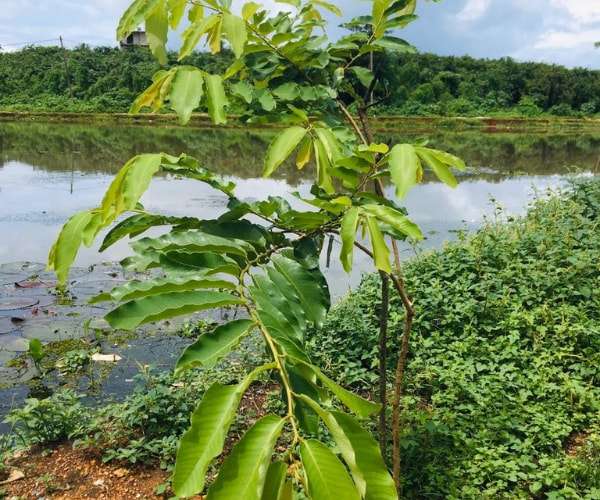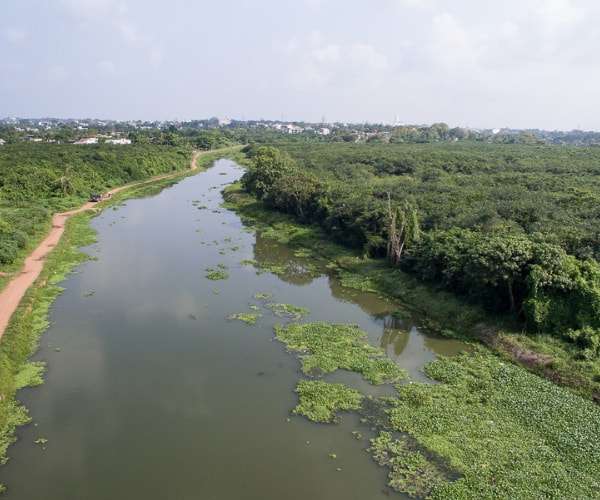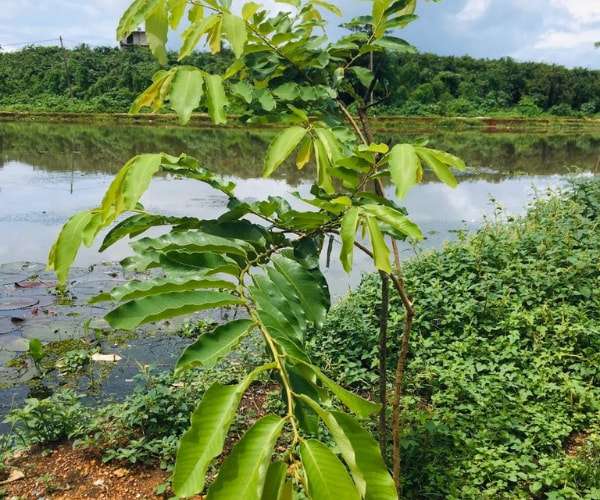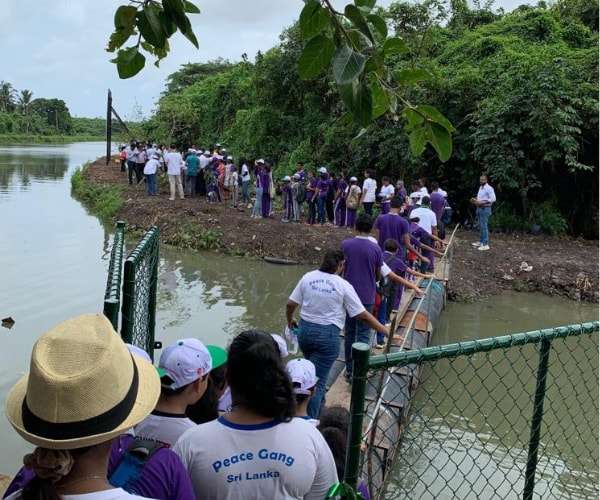Wetlands play an important role in our natural environment. They reduce the impacts of floods, absorb pollutants and improve water quality. They provide habitat for animals and plants and many contain a wide diversity of life, supporting plants and animals that are found nowhere else.
Colombo is a city built on and around wetlands. Despite progressive loss and degradation, wetlands still cover some 200 km2 of the Colombo metropolitan area and suburbs. The wetlands are fundamental to the well‐being of the people of Colombo and its suburbs. All the wetlands, even the most degraded ones, still provide a range of indirect benefits to everyone such as their ability to mitigate floods, cooling of the climate and regulation of pests.
The wetlands can reduce extreme air temperatures and make the city more liveable due to evaporative cooling. Estimates suggest that the wetland soils contain approximately 1.43 million metric tons of carbon that is equivalent to almost 90% of the annual carbon emissions from the Colombo Metropolitan Area.
The wetlands provide a critical land-mass which helps to maintain the richness of Colombo’s biodiversity.
Over 250 plant species, including nine endemic, nine nationally threatened and eleven nationally near-threatened species of plant are present in the wetlands. Almost 280 species of animals, including 32 endemic species, are present in these urban wetlands.
The wetlands support endangered animals. Although 20 critical species inhabit the wetlands of Colombo, these include four species of dragonfly, two species of butterfly, four species of land snails, two species of freshwater fish, two species of amphibian, two species of reptile and four species of mammal. Two of the endangered mammal species include the Fishing cat Prionailurus viverrinus and the Otter Lutra lutra.
Bellanwila-Attidiya wetland bird sanctuary
Bellanwila-Attidiya wetland bird sanctuary was gazetted in the year 1990. According to references it extends 372 ha and is situated on the south-eastern outskirts of Colombo, directly east of Attidiya and south of Bellanwila temple. Bellanwia-Attidiya sanctuary falls within the upper catchment of the Bolgoda river basin.
The Department of Wildlife Conservation who manage the Bellanwila-Attidiya Sanctuary confine their activities mostly to retain their land extent from encroachment while the sanctuary itself was getting degraded.
Despite all the benefits that the wetlands provide, wetlands continue to be completely lost or progressively degraded.
Bellanwila-Attidiya wetland bird sanctuary provided suitable habitat for many bird species including some rare migrants like the Glossy Ibis and the Combed Duck. However, in the past 20-30 years, due to the uncontrolled spreading of the aggressive invasive alien species, Annona Glabra the sanctuary lost almost all of its indigenous flora. This uncontrolled growth of the invasive alien species downgraded the precious bird sanctuary in Bellanwila-Attidiiya to a swamp of Annona Glabra. The authorities who manage the sanctuaries failed to control this invasion of the aggressive alien species.
When WNPS heard the cry for help, they immediately responded by finding a sponsor to provide the funds for the necessary restoration work. In 2019, WNPS embarked on this project. The work commenced with help from Sri Lanka Land Development Corporation (SLLDC) first to clear the walking trail of 1.6 km of Annona Glabra replacing with carefully selected indigenous species recommended by a team of eminent scientists who are experts in the field.
Green Isle consists of a 40-acre island where the restoration is taking place. Last year two inland lakes were created and a fair amount of Annona Glabra was thinned out with the assistance of the Sri Lanka Land Development Corporation. To date over 1500 saplings of recommended tree species have been planted. Each sapling is tagged and numbered and their growth is carefully monitored. In 2021, a further 1000 selected tree saplings will be planted while Annona Glabra is gradually thinned out further. The project maintains a tree nursery and those who are interested in supporting the project with plant saplings are most welcome to donate plants. WNPS can provide further information on the species of trees required.

One of the objectives of the project is to provide a refuge for the critically endangered endemic primate, Nestor – Purple-faced Leaf monkey which has lost most of its natural habitat. The primate expert on the technical advisory panel has assisted us in recommending suitable Nestor friendly tree species to be planted particularly along the nature trail.
WNPS is also studying and monitoring the water quality of the two inland lakes and the surrounding canals. This research is carried out by a team from the University of Kelaniya.
The Green Isle site provides ample research opportunities for Scientists interested in Flora and Fauna in Wetland systems. WNPS is ready to provide all the necessary assistance for scientists and researchers who wish to carry out such studies.
The 4-year project currently in its second year managed by the WNPS is mainly funded by Abans plc as the principal sponsor and further supported with funds from a few well-wishers of WNPS. Continued support by the Sri Lanka Land Development Corporation is also gratefully acknowledged.
RAMSAR CITY
The designation of Colombo as a Ramsar Wetland City is a milestone achievement which provides a golden opportunity to all stakeholders to actively engage in the protection and restoration of the wetlands in the city and its suburbs. With increased public awareness, international support, and combined government and citizen action, Colombo can embrace its green infrastructure and the advantages of urban wetlands.
Preserving Colombo's wetlands is a long-term investment in sustainable urban infrastructure that will pay off in many ways. In six years, Sri Lanka will have to justify the retention of Colombo's Wetland City status. Until then, it is up to all the stakeholders to work towards this goal to make the city a global leader in wetland conservation.





1 Comments
Pasindu Ishan Managamage says:
Jul 19, 2025 at 08:50 amThis bird santuary is collapsing day to day.please inform that to relevent organizations.The projects were stopped with the pandemic situation